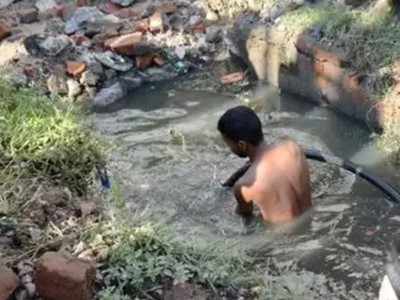The Times of India 04.08.2021
Government tells Parliament there have 941 deaths related to cleaning of sewers and septic tanks

NEW
DELHI: The Central government informed the Rajya Sabha on Wednesday
that while there are no reports of death due to manual scavenging, data
shared by states shows that the number of deaths related to cleaning of
sewers and septic tanks is 941. The maximum number of cases are from
Tamil Nadu (213) followed by Gujarat (153) and UP (104). The national Capital has reported 98 cases.
To
a question whether the government has data on the number of people
engaged in manual scavenging who lost their lives in the course of
employment, the minister of social justice and empowerment Virendra Kumar
said "there is no report of death due to manual scavenging. However, we
have reports regarding deaths of workers while being engaged in
cleaning of sewers and septic tanks." He has shared data of 941 deaths
based on reports from 21 state governments.
As
far as the number of manual scavengers is concerned, the government has
informed parliament that as per the two surveys conducted by local
authorities in 2013 and 2018, 58098 persons were working as manual
scavengers.
"All identified and eligible, 58098 manual scavengers
have been paid one time cash assistance of Rs 40,000. To enable
rehabilitation, skill development training has been provided to 16057
manual scavengers and their dependents," the minister for social justice
said. He also shared that 1387 manual scavengers, sanitation workers
and their dependents have been provided capital subsidy for self
employment projects, including sanitation related projects.
Last
week, the government's response to a similar question on manual
scavenging in Rajya sabha had stirred a controversy with activists
lashing out at the government.The Prohibition of Employment as Manual
Scavengers and Their Rehabilitation Act 2013 bans the practice. On July
28, to a question about the number of people engaged in manual savending
who died in the last five years, minister of state for social justice
and empowerment Ramdas Athawale said, “no such deaths have been reported
due to manual scavenging.” The statement immediately set off
comparisons with the Centre's recent "no deaths due to oxygen shortage"
statement.
TOI
had reported on July 30 that in a reply to a similar question in Lok
Sabha in February last year, while maintaining there had been no reports
regarding deaths due to manual scavenging, the ministry said that “the National Commission
for Safai Karamcharis has received reports regarding the death of
persons while cleaning sewers and septic tanks.” The differentiation
indicated that deaths due to surface scavenging might be rare. But it
was not clear why this explanatory information which formed part of the
reply last year was not specified in the July 28 response. Now in the
reply to a question in Rajya Sabha on Wednesday, the ministry while
responding explains that while there are no reports of deaths due to
manual scavenging there were reports of deaths related to cleaning of
sewers and septic tanks.
Earlier this year during the Budget
session the ministry had informed Lok Sabha that as many as 340 people
died while cleaning sewers and septic tanks during the last five years
as per the cases reported by the states and UTs upto December 31, 2020.
Maximum cases were reported from Uttar Pradesh at 52 deaths followed by
Tamil Nadu (43), Delhi (36), Maharashtra
(34), and 31 each in Gujarat and Haryana. The February 2020 answer also
gave state-wise details of deaths and compensation paid.
Under the
“Prohibition of Employment as Manual Scavengers and their Rehabilitation
Rules, 2013” the employer who engages workers for cleaning sewers /
septic tanks is obliged to provide the safety gear, devices and ensure
safety precautions as prescribed in the rules."
To a query on
whether government has formulated any new plan to prevent manual
cleaning of sewers, the ministry had informed Lok Sabha in February this
year that a national policy for mechanised sanitation eco-system has
been formulated in consultation with the ministry of housing and urban affairs,
department of drinking water and sanitation which envisages appointment
of a sanitation authority in every district and response units in each
municipality equipped with necessary devices and vehicles.









